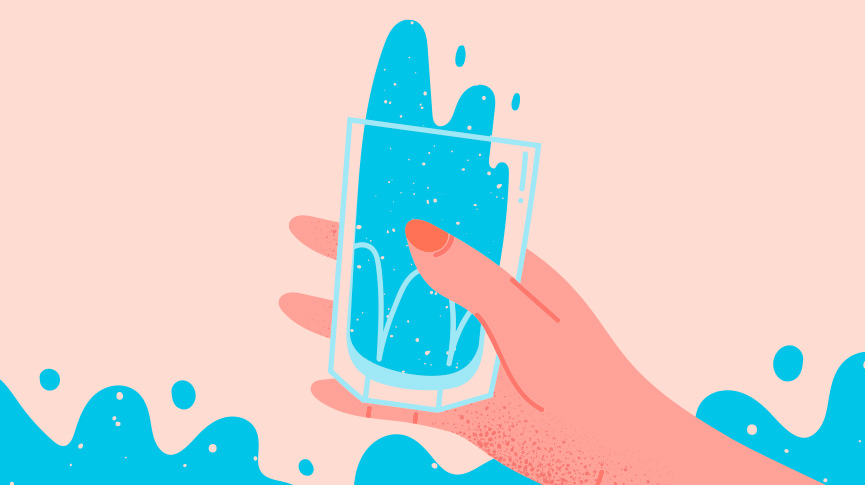What Are Electrolytes and Why Do We Need Them?

Your body is a lot more than meets the eye. Underneath your skin and hair is a complex network of organs, bones, bacteria, hormones, and all the other things that keep us alive, moving, and grooving. When things get a little out of whack, it’s easy to feel…off. Case in point – electrolytes. Have you ever had a hard workout or been in the sun all day and been thirsty, but water just wasn’t cutting it? Electrolytes may be to blame, or the lack thereof.
What Exactly are Electrolytes?
Electrolytes job is in the name. They are minerals in your body that have an electrical charge *cues the Grease Lightning from Grease*. You can find electrolytes in your blood, tissues, urine, and other body fluids. The electrolytes that work hard to keep us going are sodium, calcium, potassium, chloride, phosphate, and magnesium. Most, if not all, of those, probably sound familiar to you. What are minerals doing in your body? As above, so below. There are many things that we have in us that we wouldn’t expect, but function the same inside our body as they do for the world around us, like bacteria. So what do electrolytes do?
What Do Electrolytes Do?
When you think of electrolytes, hydration probably comes to mind. That is a very big part of what they do, but there’s a lot more to the story.
These are some of the ways electrolytes help maintain balance in your body:
- Vital for cellular function
- Move nutrients into your cells
- Move waste of out your cells
- Balance the amount of water in your body
- Balance your body’s (pH) level
- Help with blood clotting
- Regulate muscle contractions
- Make sure that your nerves, muscles, the heart, and the brain work the way they should
Let’s give a quick round of applause to electrolytes for doing the absolute most! Given just how important electrolytes are for our wellbeing, it can be quite an issue when they’re out of balance.
What Causes an Electrolyte Imbalance?
Chances are, you’ve experienced an electrolyte imbalance at some point in your life. Especially if you work out hard or spend a lot of time in hot weather. One way to tell if your electrolyte levels are low is if after working out or sweating a lot, you see white chalk on your clothing – this is a telltale sign of salt loss. Some of the main things that can cause an electrolyte imbalance are diarrhea or vomiting, certain medications, sweating, and liver or kidney problems. How do you know if your electrolyte levels are too low?
These are some symptoms of low electrolytes:
- Fatigue and low energy
- Headache
- Nausea
- Changes in blood pressure
- Muscle cramps
- Extreme thirst
- Simply not feeling well
If you experience confusion or disorientation, extreme thirst, or seizures, these are signs of extreme electrolyte imbalances and you should seek medical care urgently. Overhydration can occur if you drink too much water. This can flush electrolytes out of your system, and lead to dangerous symptoms. People usually think of your electrolytes being too low, but they can also be too high. Overusing salt can cause an imbalance known as overhydration.
How to Replenish Your Electrolytes
You’re more likely to experience too low levels of electrolytes than too high. Unless it’s a medical emergency, there are many ways you can rebalance your electrolytes at home. People typically think of sports drinks as the go-to way to replenish electrolytes. There might be some decent ones on the market, but many of them are filled with high quantities of sugar, and not enough electrolytes to actually help you rebalance your levels. They can however be a good option if you work out in hot or humid weather, exercise vigorously for long periods of time, or sweat a lot.
It’s better to maintain healthy habits that help to keep them balanced over time. You can do this by eating healthy, whole foods with plenty of fresh fruits and vegetables. You’ve heard of eating bananas if you have a cramp. Bananas are known for their potassium level, but oftentimes if you’re feeling crampy after a workout, you may actually need to replenish your sodium levels. Bananas aren’t the only food that helps balance your electrolytes though.
Some of the best foods for balancing electrolytes are:
- Leafy greens like spinach and kale
- Avocado
- Watermelon
- Oranges
- Turkey, chicken, and fish
If you sweat a lot or lose a lot of fluids through vomiting or diarrhea, you can drink coconut water or aloe vera juice which are great natural ways to boost electrolytes. You can buy electrolyte tablets or powder which can easily be added to water or juice. These are great to keep on hand if you’re traveling or spending long days outside. In more urgent situations, electrolytes can be added to an IV, which can be administered through a healthcare provider. If you have difficulty balancing your electrolyte levels, you may want to limit your caffeine and alcohol intake, which are both diuretics. There are so many ways you can help take charge of your health and feel better throughout the day. Keeping your electrolytes balanced is just one of those ways.

Natasha (she/her) is a full-spectrum doula and health+wellness copywriter. Her work focuses on deconstructing the shame, stigma, and barriers people carry around birth, sex, health, and beyond, to help people navigate through their lives with more education and empowerment. You can connect with Natasha on IG @natasha.s.weiss.


